“The fourth successive season of drought has led to the forced displacement of over 800,000 Somalia people in this year alone,” according to the September 25 Trόcaire report, which also indicates that “over three million livestock are estimated to have died since mid-2021 due to starvation and disease and pastoral households lack access to milk and saleable animals.”
The leadership of the Irish Catholic entity highlights some of the humanitarian responses in the country’s Gedo region of South-Central Somalia.
The report indicates that Trόcaire “provides 220,000 people with access free healthcare via its network of 24 healthcare facilities and emergency health and nutrition services”
Currently the entity of the Catholic Bishops of Ireland “enables 4,000 children to access quality primary education in 15 schools, partnering with local education committees to provide teacher training, schoolbooks, and to promote enrolment and retention of girls.”
On August 14, Pope Francis drew the attention of the international community to “the serious humanitarian crisis” that the people of God in Somalia and the Horn of Africa nations are facing.
(Story continues below)
“I wish to draw your attention to the serious humanitarian crisis affecting Somalia and parts of neighboring countries. The people of this region, already living in very precarious conditions, are now in mortal danger because of drought,” Pope Francis said after leading the Sunday Angelus prayer at the Vatican’s St. Peter’s Square.
He appealed for support from across the globe, saying, “I hope that international solidarity can respond effectively to this emergency.”
Meanwhile, in an interview with ACI Africa, the Director of Caritas Somalia, Sara Ben Rached, said that various organizations that had received Pope Francis’ August 14 appeal were expressing their interest to help.
“Caritas Somalia is presenting several projects to the various organizations that came forward after the Pope’s appeal,” Ms. Rached said during the August 19 interview.
The Director of the Catholic humanitarian agency that responds to catastrophes in the Horn of Africa country since its establishment in 1980 noted that the Holy Father’s appeal had reached many people.
“The Pope’s message drew the attention of the entire international community to the serious humanitarian crisis in Somalia, emphasizing above all the increasingly precarious conditions in which the population finds itself,” the Italian-born Caritas official said.
In the August 19 interview with ACI Africa, Ms. Rached said that the Catholic humanitarian agency is facing a financial hurdle in its attempt to reach out to as many affected people as possible.
“Caritas Somalia, with its reduced forces, has always stood and continues to stand by the Somali population. As you can imagine there are many needs, but unfortunately funds are lacking,” she said about the Catholic entity that officially joined the global confederation of Catholic relief agencies, Caritas Internationalis (CI), in 1983.
Silas Mwale Isenjia is a Kenyan journalist with a great zeal and interest for Catholic Church related communication. He holds a Bachelor’s Degree in Linguistics, Media and Communication from Moi University in Kenya. Silas has vast experience in the Media production industry. He currently works as a Journalist for ACI Africa.








